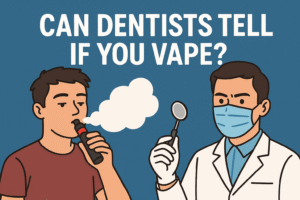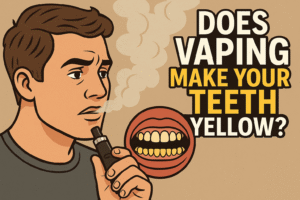
Inhaling chemicals vaporized by an electronic cigarette or vape pen has become more popular as a smoking alternative in recent years. There are worries about the potential health consequences of this practice, even though many people vape under the impression that it is a safer option.
One of these worries is if vaping can cause tonsil enlargement. This comprehensive guide will explore the relationship between vaping and tonsil swelling, shedding light on the possible connections and health implications.
Understanding Tonsils and Their Function
Tonsils, small masses of tissue in the throat, serve essential functions. Firstly, the tonsils act as the body’s first line of defense against pathogens, trapping bacteria and viruses that enter the throat. The immune system then destroys these infections. Additionally, tonsils aid in filtering harmful substances that are ingested, serving as a barrier against toxins.
Moreover, they play a role in producing antibodies, further strengthening the body’s immune response. Tonsils function as sentinels, guarding against infections, aiding the immune system’s growth and function, and filtering and neutralizing toxins. Understanding their importance underscores the need to maintain their health for overall well-being.
Potential Health Risks of Vaping
While vaping may seem less harmful than traditional smoking, it still presents significant health risks. Awareness of these risks and making informed decisions about vaping is crucial.
- Respiratory Issues
Vaping can cause several respiratory issues. Chronic diseases like bronchitis or popcorn lung may develop due to prolonged exposure.
- Lung Damage
Vaping exposes the lungs to harmful substances. Aerosol particles can deposit in the lungs, leading to inflammation and impaired lung function. Studies have also linked vaping to severe lung injuries, often called EVALI (E-cigarette or Vaping Product Use-Associated Lung Injury).
- Nicotine Addiction
Because of their high nicotine concentration, e-cigarettes are very addicting. Nicotine addiction can adversely affect mental health, increase anxiety, and lead to withdrawal symptoms after stopping.
- Unknown Long-Term Effects
As a relatively recent practice, vaping’s long-term health repercussions are not yet recognized. Researchers are still learning about potential risks, such as the possibility of cancer and developmental issues in young users.
Vaping and Tonsil Swelling: Possible Connections
While vaping might seem safer than smoking, potential connections to tonsil swelling shouldn’t be overlooked. Always consult a healthcare professional about any health concerns.
- Chemicals in E-Liquids
Vaping introduces various chemicals into the throat. E-liquids frequently contain propylene glycol and vegetable glycerin. These might cause throat irritation, resulting in tonsil swelling or inflammation.
- Bacterial Growth
The warm, moist environment in vape devices can promote bacterial growth. Inhaling these bacteria might aggravate or infect the tonsils.
- Immune Response
The body might perceive vape particles as foreign invaders. Thus, an immune response is triggered, potentially resulting in tonsil inflammation.
- Nicotine’s Role
Nicotine can restrict blood flow, delaying healing. Tonsils under stress might swell and take longer to recover with regular nicotine exposure.
- Dry Mouth
Vaping can cause dry mouth, reducing saliva production. Less saliva means fewer natural defenses against bacteria, leaving tonsils more vulnerable to swelling.
Symptoms of Swollen Tonsils
If you vape and notice throat discomfort, you might have swollen tonsils. Common symptoms include:
- Throat pain or discomfort.
- Difficulty swallowing.
- Visible tonsil enlargement.
- Redness or white patches.
- Lymph node swelling in the neck.
- Voice changes.
If these symptoms persist, consider seeking medical attention.
Protecting Tonsil Health while Vaping
Tonsils are crucial to our immune system, but vaping can compromise their health. Safeguarding your tonsils while vaping is essential for maintaining overall well-being.
- Know the Risks:
Firstly, comprehend the risks associated with vaping. E-cigarettes release harmful chemicals that can irritate and damage your tonsils. - Stay Hydrated:
Maintaining adequate hydration is vital. Drinking water helps counteract the drying effects of vaping, reducing the risk of tonsil irritation. - Choose Less Harmful E-liquids:
Opt for e-liquids with lower nicotine and fewer additives. Harsh chemicals can exacerbate tonsil inflammation. - Proper Technique:
Practice proper vaping techniques. Inhaling profoundly and forcefully can increase throat irritation, affecting your tonsils. - Regular Hygiene:
Maintain good oral hygiene. Brushing and gargling with salt water can alleviate tonsil discomfort caused by vaping. You can learn more about how vaping affect your oral health. - Take Breaks:
Take vaping breaks. Prolonged exposure can intensify tonsil irritation. Give your throat a rest. - Monitor Symptoms:
Monitor any unusual symptoms. Persistent tonsil discomfort or soreness may indicate vaping-related issues that require medical attention. - Seek Medical Advice:
If problems persist, consult a healthcare professional. They can provide tailored advice and treatment for tonsil-related issues.
Conclusion
The relationship between vaping and tonsil swelling is complex and poorly understood. While evidence suggests a potential link, further research is needed to establish causation definitively. Vapers should use prudence, be aware of the possible risks, and get medical help if tonsil-related problems continue. Ultimately, sustaining general health and well-being requires wise decisions about vaping.






